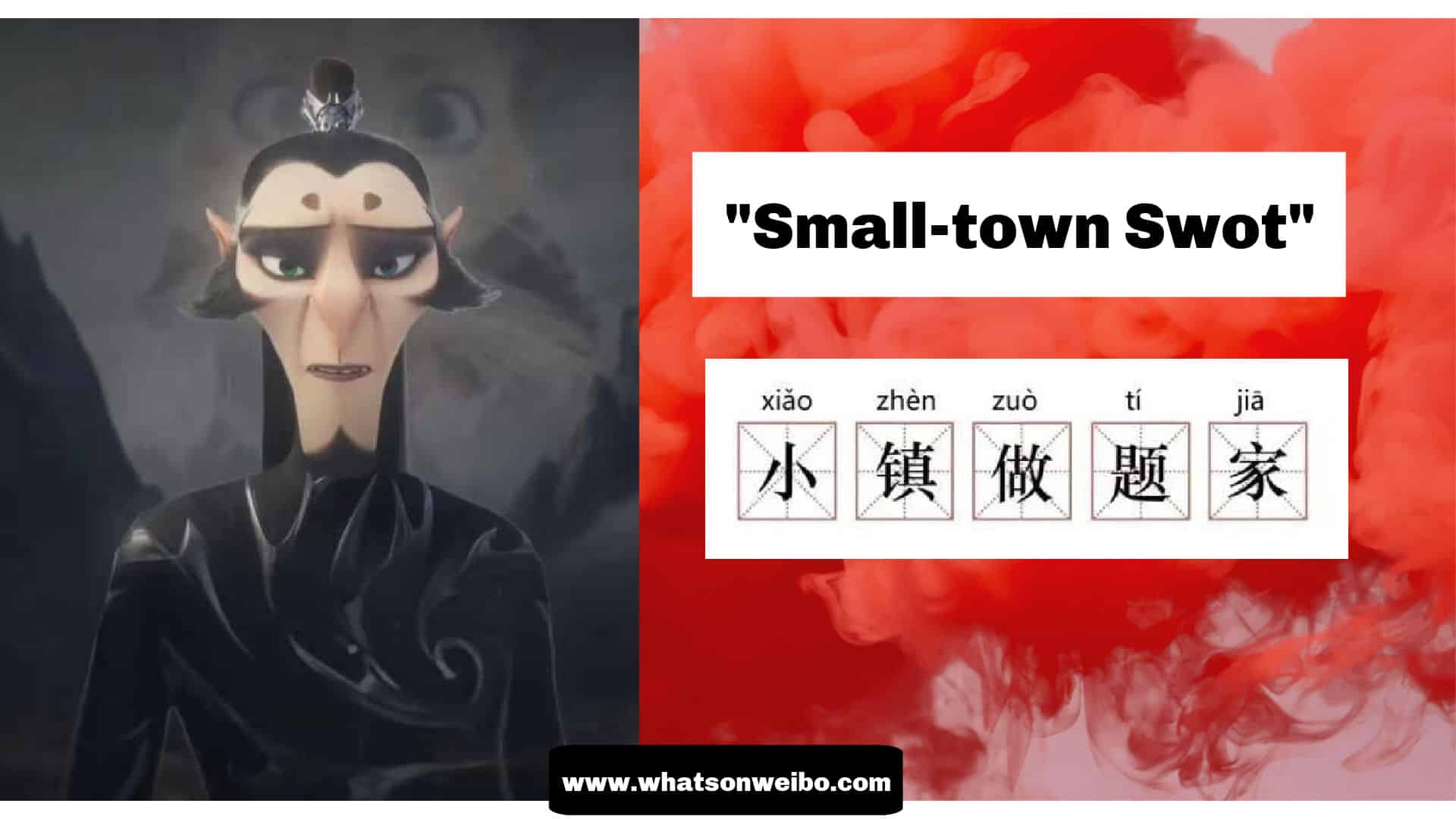China Arts & Entertainment
China’s New Hit Drama ‘Nothing But Thirty’ Thrives in the “She Era”
Chinese latest hit drama ‘Nothing but Thirty’ has 20 billion views on its Weibo hashtag page.
Published
5 years agoon

China’s latest TV drama hit Nothing But Thirty is flooding Weibo discussions. With over 20 billion views on its hashtag page, the show is one of the most popular shows of the season and demonstrates that China’s ‘she era’ (ta shidai 她时代) dramas are all the rage. What’s on Weibo’s Yin Lin Tan explains.
“Have you heard of ‘independent at the age of thirty’ (sān shí ér lì 三十而立)?” Wang Manni asks, her hair pulled back neatly and white shirt cleanly pressed. “I hope that, before I’m thirty, I’ll be promoted to supervisor.”
Riding on the wave of female protagonist (‘heroine’ 大女主) shows that have been taking over China’s entertainment scene, Nothing But Thirty (三十而已) is a 43-episode drama by Dragon Television that follows the challenges of three different women who have reached the ever-important age of thirty.

In a society where women are often expected to be married by their late twenties, a show like this, which tackles women’s present-day struggles, both in their personal and professional lives, has resonated with many.
In fact, the show is so popular that at the time of writing, the show’s hashtag (“Nothing But Thirty”, #三十而已#) has over 20 billion (!) views on Weibo.
Depicting the struggles of China’s thirty-something women
Nothing But Thirty revolves around the lives of three female leads from different walks of life. Gu Jia (Tong Yao) is a capable businesswoman turned full-time housewife; Wang Manni (Jiang Shuying) is an independent, career-oriented sales assistant; and Zhong Xiaoqin (Mao Xiaotong) is your run-of-the-mill office lady.

For Gu Jia, the birth of her son was what truly transformed her into a full-fledged housewife. In many ways, she seems like a perfect wife and mother: well-educated, capable, and thoughtful. But, eventually, she too has to face life’s challenges.
Driven and hardworking, Wang Manni is confident in both her looks and abilities. Her immediate goal, at least at the start of the show, is to achieve professional success. Throughout the show, her resilience is put to the test, personally and professionally.
Zhong Xiaoqin is described by many netizens as the most “average” or “normal” character. She is kind-hearted -sometimes to the point of being a pushover -, and has spent years at the same company without rising the ranks. Though her story might seem mundane at first, this peace is disrupted when her marriage takes a turn for the worse.
A story that resonates with the masses
“The show attracted wide attention, and it strongly resonated with female audiences. Many thirty-something working women saw their own lives reflected in the show,” Xinhua recently wrote about the show.
Nothing but Thirty currently carries a 7.6 out of 10 rating on Douban, an online reviewing platform.
Though some reviewers criticized how the later episodes of the show were unnecessarily draggy, most praised it for its portrayal of strong female characters, good acting, and largely realistic depiction of women above the age of thirty.
“I saw myself, and also saw the friends beside me,” a reviewer notes.

In China, women are, more often than not, burdened with expectations of getting married and settling down by the time they are in their late twenties. If you’re single and thirty, that’s made even worse.
Those who fall into this category carry the derogatory label of “leftover women” (剩女), a term that reflects how single women above the age of thirty are seen as consolation prizes or even unwanted goods.
Thirty is thus an incredibly important number, especially for women — something that’s clearly reflected in the show’s concept trailer.
Aside from societal expectations of starting a family, some women now also take it upon themselves to build their careers. In fact, you can chase after professional success without burdening yourself with the idea that you must be married – a notion exemplified by the character of Wang Manni.

Nothing But Thirty also showcases the sheer diversity of experiences for women above thirty: you don’t have to be married, you don’t have to be super capable, and you don’t have to be thinking about having children. Each woman goes through her own unique struggles and isn’t necessarily endowed with the so-called “protagonist’s halo.”
Ultimately, the popularity of the show is driven by the three female leads and the actresses who bring these strong characters to life.
By telling a story that is relatable and touches on relevant social issues, namely on expectations of women in society, Nothing But Thirty was able to achieve widespread popularity and is adding another notch on the trend of China’s ta shidai (她时代) dramas.
The rise of ta shidai shows
Ta shidai literally translates to “her era” or “the ‘she’ era.”
Ta shidai shows explore what it’s like to be a woman in China today. The female characters are diverse when it comes to both their backgrounds and character arcs; they might have different jobs, different levels of education, or different personalities. These shows mostly center around a strong female lead and/or a main cast that is primarily female.
More importantly, they often feature capable women and how these women overcame the odds to achieve success.
Recent shows like The Romance of Tiger and Rose (传闻中的陈芊芊) and Sisters Who Make Waves (乘风破浪的姐姐) also fall under this category, as do somewhat older hit shows such as Ode to Joy (欢乐颂) and Women in Beijing (北京女子图鉴).
The Romance of Tiger and Rose is set in a society in which women are in charge and men are subordinate, in a daring reversal of gender roles. Though the show has been criticized for using social issues to attract attention, it gained a decent following for tackling topics like gender inequality and women’s rights.

The Romance of Tiger and Rose (传闻中的陈芊芊)
A reality TV competition that swept the Chinese entertainment scene, Sisters Who Make Waves attempted to rebuke stereotypes of women over 30 as “leftover women.”
The show brought together female celebrities above the age of 30 (the oldest competitor was 52), and had them go through a series of challenges, culminating in a girl group formed by the final competitors.
Nothing But Thirty is just another example of a show that’s attempted to depict the realistic struggles of women in modern-day China.
More Chinese dramas that feature women — specifically, their struggles and the expectations that society places on them — are slated to be released in 2020.
Over the past few years, more attention has been focused on women’s rights in China. As feminism becomes an increasingly important topic of discussion in China, strongly facilitated by social media and not without controversy, companies are likely to hop on the bandwagon and continue producing shows that fall squarely in the ta shidai category, given the genre’s rising popularity.
Though we can’t expect every single show to perfectly, accurately, and realistically portray women’s struggles, the fact that more stories like these are being produced already helps bring such conversations into the mainstream.
Hopefully, the trend of ta shidai shows is a sign that these issues won’t just be tackled on camera, but in real life as well.
Read more about Chinese TV dramas here.
By Yin Lin Tan
Follow @WhatsOnWeibo
Spotted a mistake or want to add something? Please let us know in comments below or email us. First-time commenters, please be patient – we will have to manually approve your comment before it appears.
©2020 Whatsonweibo. All rights reserved. Do not reproduce our content without permission – you can contact us at info@whatsonweibo.com.
Yin Lin Tan is a Singapore-based writer and aspiring journalist specialized in culture and current affairs. She is particularly interested in exploring issues related to East Asia, with a special focus on China. Yin Lin can be reached at tylanin[at]gmail[dot]com.

You may like
China Arts & Entertainment
How K-pop Fans and the 13-Year-Old Daughter of Baidu VP Sparked a Debate on Online Privacy
What began as K-pop fan outrage targeting a snarky commenter quickly escalated into a Baidu-linked scandal and a broader conversation about data privacy on Chinese social media.
Published
3 days agoon
March 26, 2025By
Ruixin Zhang
For an ordinary person with just a few followers, a Weibo account can sometimes be like a refuge from real life—almost like a private space on a public platform—where, along with millions of others, they can express dissatisfaction about daily annoyances or vent frustration about personal life situations.
But over recent years, even the most ordinary social media users could become victims of “opening the box” (开盒 kāihé)—the Chinese internet term for doxxing, meaning the deliberate leaking of personal information to expose or harass someone online.
A K-pop Fan-Led Online Witch Hunt
On March 12, a Chinese social media account focusing on K-pop content, Yuanqi Taopu Xuanshou (@元气桃浦选手), posted about Jang Wonyoung, a popular member of the Korean girl group IVE. As the South Korean singer and model attended Paris Fashion Week and then flew back the same day, the account suggested she was on a “crazy schedule.”
In the comment section, one female Weibo user nicknamed “Charihe” replied:
💬 “It’s a 12-hour flight and it’s not like she’s flying the plane herself. Isn’t sleeping in business class considered resting? Who says she can’t rest? What are you actually talking about by calling this a ‘crazy schedule’..”

Although the comment may have come across as a bit snarky, it was generally lighthearted and harmless. Yet unexpectedly, it brought disaster upon her.
That very evening, the woman nicknamed Charihe was bombarded with direct messages filled with insults from fans of Jang Wonyoung and IVE.
Ironically, Charihe’s profile showed she was anything but a hater of the pop star—her Weibo page included multiple posts praising Wonyoung’s beauty and charm. But that context was ignored by overzealous fans, who combed through her social media accounts looking for other posts to criticize, framing her as a terrible person.
After discovering through Charihe’s account that she was pregnant, Jang Wonyoung’s fans escalated their attacks by targeting her unborn child with insults.
The harassment did not stop there. Around midnight, fans doxxed Charihe, exposing her personal information, workplace, and the contact details of her family and friends. Her friends were flooded with messages, and some were even targeted at their workplaces.
Then, they tracked down Charihe’s husband’s WeChat account, sent him screenshots of her posts, and encouraged him to “physically punish” her.
The extremity of the online harassment finally drew backlash from netizens, who expressed concern for this ordinary pregnant woman’s situation:
💬 “Her entire life was exposed to people she never wanted to know about.”
💬 “Suffering this kind of attack during pregnancy is truly an undeserved disaster.”
Despite condemnation of the hate, some extreme self-proclaimed “fans” remained relentless in the online witch hunt against Charihe.
Baidu Takes a Hit After VP’s 13-Year-Old Daughter Is Exposed
One female fan, nicknamed “YourEyes” (@你的眼眸是世界上最小的湖泊), soon started doxxing commenters who had defended her. The speed and efficiency of these attacks left many stunned at just how easy it apparently is to trace social media users and doxx them.
Digging into old Weibo posts from the “YourEyes” account, people found she had repeatedly doxxed people on social media since last year, using various alt accounts.
She had previously also shared information claiming to study in Canada and boasted about her father’s monthly salary of 220,000 RMB (approx. $30.3K), along with a photo of a confirmation document.
Piecing together the clues, online sleuths finally identified her as the daughter of Xie Guangjun (谢广军), Vice President of Baidu.
From an online hate campaign against an innocent, snarky commenter, the case then became a headline in Chinese state media, and even made international headlines, after it was confirmed that the user “YourEyes”—who had been so quick to dig up others’ personal details—was in fact the 13-year-old daughter of Xie Guangjun, vice president at one of China’s biggest tech giants.
On March 17, Xie Guangjun posted the following apology to his WeChat Moments:

💬 “Recently, my 13-year-old daughter got into an online dispute. Losing control of her emotions, she published other people’s private information from overseas social platforms onto her own account. This led to her own personal information also getting exposed, triggering widespread negative discussion.
As her father, I failed to detect the problem in time and failed to guide her in how to properly handle the situation. I did not teach her the importance of respecting and protecting the privacy of others and of herself, for which I feel deep regret.
In response to this incident, I have communicated with my daughter and sternly criticized her actions. I hereby sincerely apologize to all friends affected.
As a minor, my daughter’s emotional and cognitive maturity is still developing. In a moment of impulsiveness, she made a wrong decision that hurt others and, at the same time, found herself caught in a storm of controversy that has subjected her to pressure and distress far beyond her age.
Here, I respectfully ask everyone to stop spreading related content and to give her the opportunity to correct her mistakes and grow.
Once again, I extend my apologies, and I sincerely thank everyone for your understanding and kindness.”
The public response to Xie’s apology has been largely negative. Many criticized the fact that it was posted privately on WeChat Moments rather than shared on a public platform like Weibo. Some dismissed the statement as an attempt to pacify Baidu shareholders and colleagues rather than take real accountability.
Netizens also pointed out that the apology avoided addressing the core issue of doxxing. Concerns were raised about whether Xie’s position at Baidu—and potential access to sensitive information—may have helped his daughter acquire the data she used to doxx others.
Adding fuel to the speculation were past conversations allegedly involving one of @YourEyes’ alt accounts. In one exchange, when asked “Who are you doxxing next?” she replied, “My parents provided the info,” with a friend adding, “The Baidu database can doxx your entire family.”
Following an internal investigation, Baidu’s head of security, Chen Yang (陈洋), stated on the company’s internal forum that Xie Guangjun’s daughter did not obtain data from Baidu but from “overseas sources.”
However, this clarification did little to reassure the public—and Baidu’s reputation has taken a hit. The company has faced prior scandals, most notably a the 2016 controversy over profiting from misleading medical advertisements.
Online Vulnerability
Beyond Baidu’s involvement, the incident reignited wider concerns about online privacy in China. “Even if it didn’t come from Baidu,” one user wrote, “the fact that a 13-year-old can access such personal information about strangers is terrifying.”
Using the hashtag “Reporter buys own confidential data” (#记者买到了自己的秘密#), Chinese media outlet Southern Metropolis Daily (@南方都市报) recently reported that China’s gray market for personal data has grown significantly. For just 300 RMB ($41), their journalist was able to purchase their own household registration data.
Further investigation uncovered underground networks that claim to cooperate with police, offering a “70-30 profit split” on data transactions.
These illegal data practices are not just connected to doxxing but also to widespread online fraud.
In response, some netizens have begun sharing guides on how to protect oneself from doxxing. For example, they recommend people disable phone number search on apps like WeChat and Alipay, hide their real name in settings, and avoid adding strangers, especially if they are active in fan communities.
Amid the chaos, K-pop fan wars continue to rage online. But some voices—such as influencer Jingzai (@一个特别虚荣的人)—have pointed out that the real issue isn’t fandom, but the deeper problem of data security.
💬 “You should question Baidu, question the telecom giants, question the government, and only then, fight over which fan group started this.”
As for ‘Charihe,’ whose comment sparked it all—her account is now gone. Her username has become a hashtag. For some, it’s still a target for online abuse. For others, it is a reminder of just how vulnerable every user is in a world where digital privacy is far from guaranteed.
By Ruixin Zhang
Independently covering digital China for over a decade. Like what we do? Support us and get the story behind the hashtag by subscribing:
edited for clarity by Manya Koetse
Spotted a mistake or want to add something? Please let us know in comments below or email us. First-time commenters, please be patient – we will have to manually approve your comment before it appears.
©2024 Whatsonweibo. All rights reserved. Do not reproduce our content without permission – you can contact us at info@whatsonweibo.com.
China Memes & Viral
How Ne Zha 2’s Shen Gongbao Became Known as the Ultimate “Small-Town Swot”
Published
4 weeks agoon
March 1, 2025
PART OF THIS TEXT COMES FROM THE WEIBO WATCH PREMIUM NEWSLETTER
Over the past few weeks, the Chinese blockbuster Ne Zha 2 has been trending on Weibo every single day. The movie, loosely based on Chinese mythology and the Chinese canonical novel Investiture of the Gods (封神演义), has triggered all kinds of memes and discussions on Chinese social media (read more here and here).
One of the most beloved characters is the leopard demon Shen Gongbao (申公豹). While Shen Gongbao was a more typical villain in the first film, the narrative of Ne Zha 2 adds more nuance and complexity to his character. By exploring his struggles, the film makes him more relatable and sympathetic.
In the movie, Shen is portrayed as a sometimes sinister and tragic villain with humorous and likeable traits. He has a stutter, and a deep desire to earn recognition. Unlike many celestial figures in the film, Shen Gongbao was not born into privilege and never became immortal. As a demon who ascended to the divine court, he remains at the lower rungs of the hierarchy in Chinese mythology. He is a hardworking overachiever who perhaps turned into a villain due to being treated unfairly.
Many viewers resonate with him because, despite his diligence, he will never be like the gods and immortals around him. Many Chinese netizens suggest that Shen Gongbao represents the experience of many “small-town swots” (xiǎozhèn zuòtíjiā 小镇做题家) in China.
“Small-town swot” is a buzzword that has appeared on Chinese social media over the past few years. According to Baike, it first popped up on a Douban forum dedicated to discussing the struggles of students from China’s top universities. Although the term has been part of social media language since 2020, it has recently come back into the spotlight due to Shen Gongbao.
“Small-town swot” refers to students from rural areas and small towns in China who put in immense effort to secure a place at a top university and move to bigger cities. While they may excel academically, even ranking as top scorers, they often find they lack the same social advantages, connections, and networking opportunities as their urban peers.
The idea that they remain at a disadvantage despite working so hard leads to frustration and anxiety—it seems they will never truly escape their background. In a way, it reflects a deeper aspect of China’s rural-urban divide.
Some people on Weibo, like Chinese documentary director and blogger Bianren Guowei (@汴人郭威), try to translate Shen Gongbao’s legendary narrative to a modern Chinese immigrant situation, and imagine that in today’s China, he’d be the guy who trusts in his hard work and intelligence to get into a prestigious school, pass the TOEFL, obtain a green card, and then work in Silicon Valley or on Wall Street. Meanwhile, as a filial son and good brother, he’d save up his “celestial pills” (US dollars) to send home to his family.
Another popular blogger (@痴史) wrote:
“I just finished watching Ne Zha and my wife asked me, why do so many people sympathize with Shen Gongbao? I said, I’ll give you an example to make you understand. Shen Gongbao spent years painstakingly accumulating just six immortal pills (xiāndān 仙丹), while the celestial beings could have 9,000 in their hand just like that.
It’s like saving up money from scatch for years just to buy a gold bracelet, only to realize that the trash bins of the rich people are made of gold, and even the wires in their homes are made of gold. It’s like working tirelessly for years to save up 60,000 yuan ($8230), while someone else can effortlessly pull out 90 million ($12.3 million).In the Heavenly Palace, a single meal costs more than an ordinary person’s lifetime earnings.
Shen Gongbao seems to be his father’s pride, he’s a role model to his little brother, and he’s the hope of his entire village. Yet, despite all his diligence and effort, in the celestial realm, he’s nothing more than a marginal figure. Shen Gongbao is not a villain, he is just the epitome of all of us ordinary people. It is because he represents the state of most of us normal people, that he receives so much empathy.”
In the end, in the eyes of many, Shen Gongbao is the ultimate small-town swot. As a result, he has temporarily become China’s most beloved villain.
By Manya Koetse, with contributions by Wendy Huang
Follow @whatsonweibo
Spotted a mistake or want to add something? Please let us know in comments below or email us. Please note that your comment below will need to be manually approved if you’re a first-time poster here.
©2025 Whatsonweibo. All rights reserved. Do not reproduce our content without permission – you can contact us at info@whatsonweibo.com
Subscribe

How K-pop Fans and the 13-Year-Old Daughter of Baidu VP Sparked a Debate on Online Privacy

Squat or Sit? China’s Great Toilet Debate and the Problem of Footprints on the Seat

Weibo Watch: The Great Squat vs Sitting Toilet Debate in China🧻

Chinese Netizens Turn to Tim Cook Over Battery Factory’s Illegal Overtime

Revisiting China’s Most Viral Resignation Letter: “The World Is So Big, I Want to Go and See It”

Our Picks: Top 10 Chinese Buzzwords and Phrases of 2024 Explained

“Dear Li Hua”: The TikTok/Xiaohongshu Honeymoon Explained

Beyond the Box Office: What’s Behind Ne Zha 2’s Success?

Weibo Watch: Christmas in China Is Everywhere and Nowhere

Weibo Watch: A New Chapter

15 Years of Weibo: The Evolution of China’s Social Media Giant

Tuning Into the Year of the Snake

The ‘China-chic Girl’ Image and the Realities of China’s Competitive Food Delivery Market

TikTok Refugees, Xiaohongshu, and the Letters from Li Hua

“Black Myth: Wukong”: From Gaming Screens to the CMG Spring Festival Gala?
Get in touch
Would you like to become a contributor, or do you have any tips or suggestions? Get in touch here!
Popular Reads
-

 China Insight11 months ago
China Insight11 months agoThe Tragic Story of “Fat Cat”: How a Chinese Gamer’s Suicide Went Viral
-

 China Music12 months ago
China Music12 months agoThe Chinese Viral TikTok Song Explained (No, It’s Not About Samsung)
-

 China Digital10 months ago
China Digital10 months agoChina’s 2024 Gaokao Triggers Online Discussions on AI
-

 China Arts & Entertainment11 months ago
China Arts & Entertainment11 months agoSinging Competition or Patriotic Fight? Hunan TV’s ‘Singer 2024’ Stirs Nationalistic Sentiments




